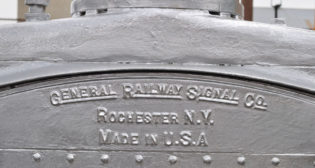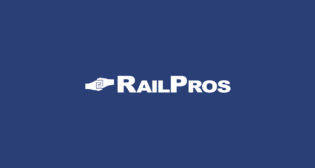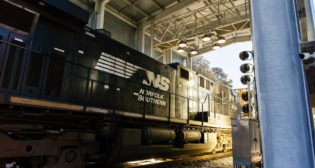
UPDATED: TTC Management Transitioning to ‘DOT-Wide’ Contract
Written by Marybeth Luczak, Executive EditorManagement of the Pueblo, Colo.-based Transportation Technology Center (TTC) will move to a new vendor as of October 2022.
More than 50 miles of railroad track and specialized laboratories for testing locomotives, vehicles, track components and communications and signaling devices in the Colorado desert outside of Pueblo comprise the TTC, which is owned by the Federal Railroad Administration (FRA). Since 1982, the Association of American Railroads (AAR) has managed the TTC, most of that time through Transportation Technology Center, Inc. (TTCI), its wholly owned subsidiary. TTCI has held successive single-source Care, Custody and Control Contracts signed with the Federal Railroad Administration (FRA).
In 2019, FRA issued an RFI (Request for Information) on updating the facility and its functions, possibly to incorporate testing for other U.S. Department of Transportation agencies such as PHMSA (Pipeline and Hazardous Materials Administration):
Download the RFI:
On March 5, TTCI issued a press release, stating that there would be a transition to a new “Department of Transportation (DOT) wide contract to support all modes of transportation.” On March 8, ENSCO, Inc., a Virginia-based corporation that operates in the defense, transportation, aerospace and intelligence sectors, announced that it had been awarded a $571 million contract to provide research and development, testing, engineering and training services at TTC “in support of the FRA goal of establishing the TTC as a center for rail and ground transportation innovation.” The contract term includes a five-year base period and three, five-year option periods for a total of 20 years from award date. Transition of the DOT operations, maintenance and research programs to ENSCO will be completed by October 2022, the company said.
ENSCO’s contract is FRA Contract 693JJ621D000001, Management/Training/R&D at the Technology Transportation Center in Pueblo, CO. Details:
“ENSCO, Inc., located in Springfield, Va., is being awarded an Indefinite Delivery/Indefinite Quantity contract for facilities management, operations and maintenance support to maintain the Federal Railroad Administration’s Transportation Technology Center (TTC), as well as the provision of training support and research and development activities. All work will be performed at the TTC facility in Pueblo, Colo. TTC includes more than 50 miles of railroad track, buildings, substations, communication systems, interior roadways, an electrical power grid, water and sanitation systems, solid and hazardous waste management systems, and fuel storage areas. This contract includes options which, if exercised, would bring the cumulative value of this contract to $570,939,950. Funds will be obligated by individual Task Orders and Task Orders may be priced on a Firm-Fixed Price or Cost-Plus-Fixed Fee basis. The total anticipated length of the contract, excluding a phase-in six-month transition period, is 20 years, consisting of a five-year base period and three, five-year option periods. All Department of Transportation agencies can utilize this vehicle for their requirements. This contract was competitively procured after setting aside the requirement for small businesses; proposals were solicited and received via Beta.Sam.Gov. The Federal Railroad Administration, Washington, D.C., is the contracting activity.”
“As the awardee, ENSCO will operate and maintain the TTC in support of the USOT to develop a vibrant, engaging and modern TTC that fosters innovation, encourages positive change and creates opportunity,” ENSCO said. “ENSCO will also expand the use of the facility to support other government and commercial entities to achieve the broader mission of transportation safety, security and innovation.”
ENSCO said it will be “supported by a team of leading surface transportation research, training, technology and facilities management organizations focused on next generation technology supporting transportation infrastructure. This team will be further supported by the Center for Surface Transportation Testing and Academic Research (C-STTAR) consortium of eight universities and academic research centers. C-STTAR was established by ENSCO to provide expertise in research focus areas across all modes of surface transportation, including intermodal transportation, which will support TTC growth initiatives.”
“ENSCO looks forward to supporting FRA’s vision for the Transportation Technology Center,” said Boris Nejikovsky, President, ENSCO, Inc. “We have assembled an incredible team of industry and university research, safety, technology, testing and training entities to serve the needs of FRA, DOT and the surface transportation industry. We are excited to support the many site stakeholders, including the AAR and its members, to continue the important railroad research occurring at the center today and to expand the capabilities of the site to other modes of transportation with this robust team. ENSCO also looks forward to supporting the local Pueblo, Colo., economy by partnering with local leadership, universities and business, attracting visitors who participate in site activities and recruiting top technical talent to the area.”
TTCI told Railway Age that it “will continue to deliver in all of its capacities in support of the AAR. This includes and is not limited to support of AAR standards, industry testing, training and research. The TTC will be managed by a new incumbent. Additional details regarding TTCI’s use of the TTC beyond that date are forthcoming, and we will provide updates as they become available.”
TTCI, in its formal announcement, which made no mention of ENSCO, noted that the transition to a new facilities manager under a new Care, Custody and Control Contracts “is not expected to result in major modifications to TTCI’s services. TTCI will continue to perform research and engineering services in accordance with its mission to advance safety, reliability and efficiency in the rail industry, and will determine any future usage of the TTC in alignment with the new DOT contractual condition and site availability. The nature and location of [TTCI’s] studies have evolved to meet the demands of changing technology. Today, these efforts occur in diverse locations across North America,” including the TTC. ENSCO is not an AAR Associate Member.
Editor’s Note: This is a developing story. Railway Age has ascertained from an independent source that, in light of ENSCO’s contract award, the AAR/TTCI is considering its options, among which could be lodging a formal protest. The Simmons-Boardman Rail Group editorial team at Railway Age, Railway Track & Structures and International Railway Journal will endeavor to stay on top of all new developments and update this story as needed.
An observer writes: “The AAR/TTCI press release is misleading. ENSCO actually got a Care, Custody and Control contract, similar in scope to what AAR/TTCI had, effective September 2022. The only real difference—which is fairly significant—is that the minimum investment requirements are gone. ENSCO must maintain the facility to a commercial standard. As before, the bids went to the USDOT Acquisition Board, or whatever it is called now. It appears that it was a straight-up procurement, and AAR/TTCI simply lost the acquisition. Thankfully, USDOT did not go the mistaken route of separating facilities management from contracted R&D functions. The concept of two separate contracts has been suggested by those having no clue about how this facility actually operates, and would be a huge mistake. The unified structure is necessary to allow business activity to support property investment. Otherwise, the property management contractor has no incentive to be efficient and would constantly be looking to USDOT for funding, which it doesn’t have. If AAR/TTCI were to play its cards right, this is not necessarily such a bad thing. They have valuable proprietary commercial information and extensive contracts and contacts that could be useful to ENSCO in a subcontract relationship. In fact, the riskiest part of the unified contract—inadequate business revenue to support proper upkeep of the facility—has been removed. So AAR/ TTCI could actually prosper out there, though in a significantly reduced footprint. But if they protest the procurement—as they may be threatening—they can kiss all that goodbye. I’m not sure they can see past the loss of the competition to think ahead strategically to a different role. And the wildcard is how AAR handles railroad research and testing activities at TTC. The U.S. railroad industry needs to do work out there. But whether the trade association promotes that without AAR/TTCI actually running the place remains to be seen.” – William C. Vantuono



